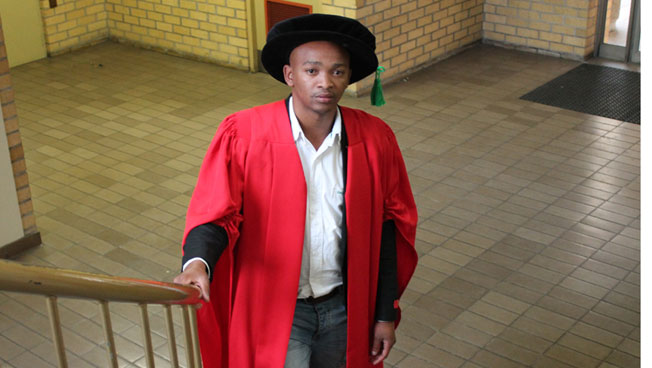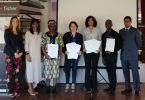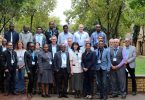Job offers came streaming in after Lukhanyo Mekuto became one of the youngest people to obtain a doctoral degree from CPUT at the age of 28.
He declined an offer from Mayor Patricia de Lille and took up a postdoctoral fellowship at CPUT in October. He also got offers from subcontractors for the Department of Water Affairs as well as Stellenbosch University.
Next year sees him flying the CPUT coop, after 10 years – he arrived as a first year student in 2008 – to work as a researcher at the University of Johannesburg’s (UJ) Faculty of Engineering.
“The mayor offered me an internship that would not add value to me or my capabilities,” he says in answer to why he declined the offer from her. “I accepted the [CPUT] offer to avoid professional stagnancy. I wanted to boost my research profile and felt this opportunity would provide me with that platform.”
His doctoral thesis examined the biological treatment of industrial wastewater. Lukhanyo investigated the use of micro-organism to break up the cyanide contaminating drinking water as a result of mining activities.
Prof Marshall Sheldon, Acting Deputy Vice-Chancellor: Research, Technology Innovation and Partnerships, says her interest “in nurturing talent and building capacity in terms of future academics in Engineering” led her to offer Lukhanyo the position at CPUT. Furthermore Lukhanyo’s supervisor, Prof Seteno Nktwampe, was her very first doctoral student. “I wanted to assist [Lukhanyo] in furthering his academic career. This was also opportune as I was looking for a postdoctoral fellow to assist me with my NRF-funded research project,” she explains.
With his appointment at UJ, Lukhanyo, who the day before he graduated in September was honoured by the NRF with a Research Excellence Award for Next Generation Researchers, remains on track to pursue an academic career. “My immediate goal over the next five years is to obtain an NRF P-rating. This means I’ll need to step up my research activities. Also, I want to participate in research that would ultimately impact on the society in a positive manner, and not do research for the sake of publishing journal articles and books.”
Job offers came streaming in after Lukhanyo Mekuto became one of the youngest people to obtain a doctoral degree from CPUT at the age of 28.
He declined an offer from Mayor Patricia de Lille and took up a postdoctoral fellowship at CPUT in October. He also got offers from subcontractors for the Department of Water Affairs as well as Stellenbosch University.
Next year sees him flying the CPUT coop, after 10 years – he arrived as a first year student in 2008 – to work as a researcher at the University of Johannesburg’s (UJ) Faculty of Engineering.
“The mayor offered me an internship that would not add value to me or my capabilities,” he says in answer to why he declined the offer from her. “I accepted the [CPUT] offer to avoid professional stagnancy. I wanted to boost my research profile and felt this opportunity would provide me with that platform.”
His doctoral thesis examined the biological treatment of industrial wastewater. Lukhanyo investigated the use of micro-organism to break up the cyanide contaminating drinking water as a result of mining activities.
Prof Marshall Sheldon, Acting Deputy Vice-Chancellor: Research, Technology Innovation and Partnerships, says her interest “in nurturing talent and building capacity in terms of future academics in Engineering” led her to offer Lukhanyo the position at CPUT. Furthermore Lukhanyo’s supervisor, Prof Seteno Nktwampe, was her very first doctoral student. “I wanted to assist [Lukhanyo] in furthering his academic career. This was also opportune as I was looking for a postdoctoral fellow to assist me with my NRF-funded research project,” she explains.
With his appointment at UJ, Lukhanyo, who the day before he graduated in September was honoured by the NRF with a Research Excellence Award for Next Generation Researchers, remains on track to pursue an academic career. “My immediate goal over the next five years is to obtain an NRF P-rating. This means I’ll need to step up my research activities. Also, I want to participate in research that would ultimately impact on the society in a positive manner, and not do research for the sake of publishing journal articles and books.”







